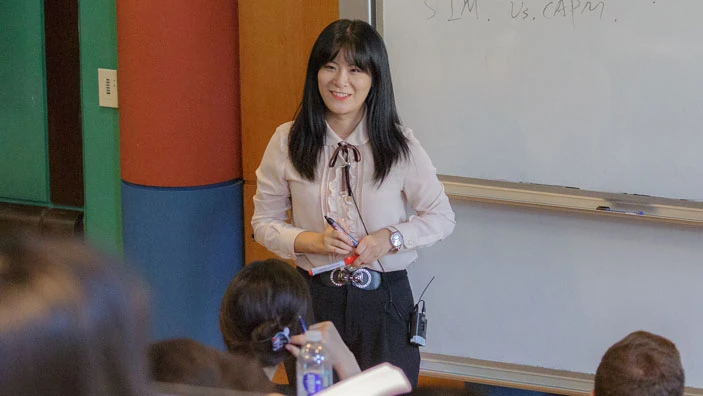Overview
Stream A starts with an MPhil in Strategy, Marketing, Operations and Organisational Behaviour (SMOOB) or a Master of Research (MRes). This stream brings together theories from the diverse fields of strategy, economics, psychology, sociology and organisational behaviour to understand strategic management within corporations and to study issues that are of primary concern to senior managers. You are encouraged to pursue novel, insightful and thought-provoking research questions that shed new light and change the theoretical conversation on how firms position themselves within their environment and how they successfully survive and succeed in increasingly complex and fast changing business world. This stream adopts rigorous quantitative approaches such as econometrics and behavioural statistics to investigate these important firm-level strategy issues.

The pathway
To start on the Strategic Management (Stream A) pathway you must take one of the following 9-month masters programmes:
MPhil in Strategy, Marketing, Operations and Organisational Behaviour
Essential reading
Download detailed information about the 9-month + 4-year programme structure and content.
Research areas
Our research addresses the resources, capabilities and strategic positioning that firms need to create and sustain competitive advantage and boost long-term performance. To do so we employ a variety of research design approaches, including large-scale surveys, archival data, lab and natural experiments and mixed approaches that combine these methods.
Faculty areas of research interest include:
- How does the experience profile, values and beliefs, and cognitive orientations of CEOs and senior executives, shape strategic choices?
- Which industry and organisational factors determine the types of executive profiles needed to gain competitive advantage through innovation, flexibility and adaptation to environments?
- How do firms outperform rivals?
- What are the sources of competitive advantage?
- How do firms develop new resources and capabilities or combine existing resources in unique ways to create value and gain sustainable advantage in the marketplace?
- What are the drivers of corporate strategies such as mergers and acquisitions and strategic alliances?
- What are the drivers of success and failure for these strategies?
- What are the approaches that multinational enterprises (MNEs) use to gain global leadership?
- How do the unique cultural, institutional and competitive environments in different countries enable or hinder firms’ international strategies?
- What constitutes effective board governance and board capital?
- What are key complementarities and tensions in CEO and board human/social capital combinations?
- How do firms’ board governance and ownership structures impact the CEO and executive succession choices, strategic choices, and value creation?
What we expect from you
Prepare to join a highly selective and globally diverse pathway. You will need to have a first class bachelors degree or equivalent. In some cases you will need to have a masters degree from a highly regarded university and to have performed within the top 5% in your class. We welcome outstanding applicants with degrees from a variety of disciplines, including business, economics, mathematics, engineering, psychology and the physical sciences and humanities. See the MPhil in Strategy, Marketing, Operations and Organisational Behaviour (SMOOB) or Master of Research (MRes) academic requirements for more details.
You will demonstrate a high level of commitment to an academic career in a business school as well as a desire to engage with external organisations. We will need to see evidence of excellent writing skills and strong evidence of your quantitative ability, for example through high grades in mathematics and statistics courses at university level or through GRE results. Practical management experience is welcome but not essential.
For more details, please see the academic requirements for the:
MPhil in Strategy, Marketing, Operations and Organisational Behaviour
What you can expect from us
Get the preparation you need to conduct independent, high-calibre quantitative research in strategic management and pursue an academic career as a faculty member at a major university.
- Benefit from rigorous academic training via an integrated and coherent programme of study that includes intensive seminars and workshops.
- Understand the latest quantitative research methods and emerging thinking in strategic management.
- Receive funds to attend cutting-edge and highly specialised quantitative or mixed research methods workshops offered by renowned scholars at other institutions.
- Work with the faculty on joint research projects for presentation at top international conferences and for publication in leading academic journals.
- Faculty members maintain research collaborations with students long after they have graduated.
- Interact closely with outstanding fellow PhD students who represent a wide variety of professional backgrounds, nationalities and ethnicities.
- Connect and collaborate with leading strategy scholars from around the world through our active research seminars and renowned visiting scholar programmes.
- Get school support to spend part of your PhD time at a strategic management department at another top school. Our students have spent time at renowned institutions such as MIT, UC Berkeley, Columbia, Wharton, Darden and Michigan as a part of the PhD programme.
- Experience our hallmark high standards of academic rigour and strong practical relevance to the business world.
- Get our assistance in engaging with organisations directly to gain access to unique data and rich insights on key strategy problems they face.
- You will have access to comprehensive research databases, the latest software and computer equipment and a fully equipped behavioural lab.
PhD supervisors
Your principal supervisor will be a senior academic, often Professor or Associate Professor, from within the Strategy and International Business subject group. You will benefit from their guidance and counsel throughout the programme, and beyond: in helping you to succeed in the job market and in gaining a faculty position at a leading business school. Your principal supervisor will take an active role in your research programme and will assemble a group of faculty (your advisory committee) who will co-author papers with you.
Take a look at the faculty who may serve as your principal supervisor and view their research interests:
Allègre Hadida
Associate Professor in Strategy
Research interests
Allègre Hadida researches strategy and decision-making in volatile environments, with a particular interest in creative, arts and media industries and organisations. Other research interests include: temporary and project-based organisations; integration of new technologies, including digital content production and broadcast, in traditional arts organisations; roles and resources in cinema; gender and racial labour discrimination; creativity and improvisation in business.
Yasemin Kor
Beckwith Professor of Management Studies
Research interests
Yasemin Kor researches the intersections of strategy formulation and renewal, top management teams, and corporate governance. She studies strategy as a configuration of resources and capabilities that are uniquely assembled to achieve a purpose. In her research, she examines how organisations differ in ways in which they manage and govern their resources and capabilities. One of her current projects focuses on the organic food industry and examines how firms respond to the organic opportunity based on the CEO’s experience profile, including enriching experiences of the CEO. In another project, she examines the role of the independent board chair in achieving effective board governance. She enjoys doing research both on large corporations and entrepreneurial firms.
Christopher Marquis
Sinyi Professor of Chinese Management
Not available to take incoming PhD students in October 2026
Research interests
Professor Marquis’s research is broadly focused on the two areas of social innovation and change and doing business in China. Under these themes he has examined entrepreneurship in China, the triple-bottom line and building sustainable businesses globally, and business competition in emerging markets. These research projects build on Marquis’s earlier research on how business can have a positive impact on society and in particular how historical and geographical processes have shaped firms’ and entrepreneurs’ social and environmental strategies and activities. His latest book, Better Business: How the B Corp Movement Is Remaking Capitalism, focuses on the potential for stakeholder governance models to reform capitalism.
Lionel Paolella
Professor of the Social Sciences and Organisations
Research interests
Lionel Paolella researches strategy and economic sociology; organisation theory; categorisation; social evaluation; gender diversity. Lionel’s main line of research explores how market categories – a set of firms that share cognitive and cultural similarities – affect the social evaluation, the innovation and performance of organisations. He mainly uses quantitative methods.
Strategy and International Business faculty
Learn more about the faculty that teach on this pathway.
Learn more about the Strategy and International Business subject group





